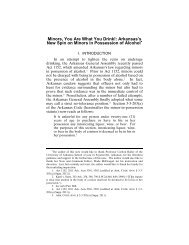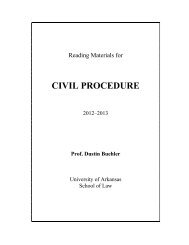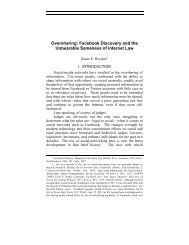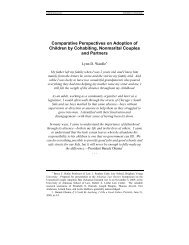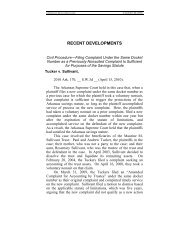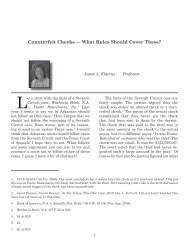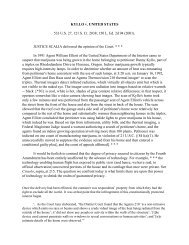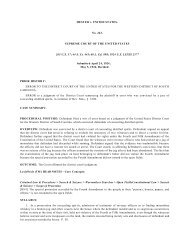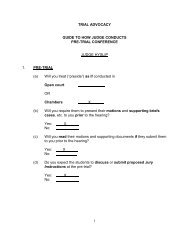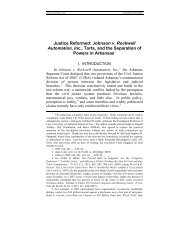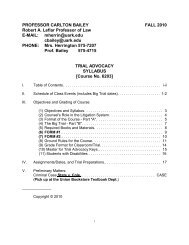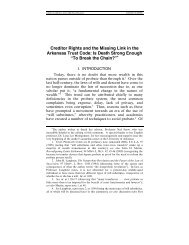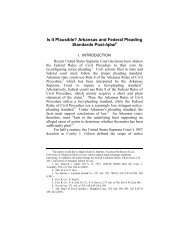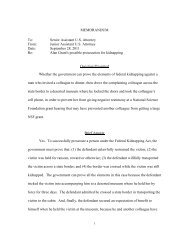PAYTON v. NEW YORK
PAYTON v. NEW YORK
PAYTON v. NEW YORK
You also want an ePaper? Increase the reach of your titles
YUMPU automatically turns print PDFs into web optimized ePapers that Google loves.
A rule permitting warrantless arrest entries would not pose a danger that officers would use their<br />
entry power as a pretext to justify an otherwise invalid warrantless search. A search pursuant to a<br />
warrantless arrest entry will rarely, if ever, be as complete as one under authority of a search<br />
warrant. If the suspect surrenders at the door, the officers may not enter other rooms. Of course,<br />
the suspect may flee or hide, or may not be at home, but the officers cannot anticipate the first<br />
two of these possibilities and the last is unlikely given the requirement of probable cause to<br />
believe that the suspect is at home. Even when officers are justified in searching other rooms,<br />
they may seize only items within the arrestee's possession or immediate control or items in plain<br />
view discovered during the course of a search reasonably directed at discovering a hiding<br />
suspect. Hence a warrantless home entry is likely to uncover far less evidence than a search<br />
conducted under authority of a search warrant. Furthermore, an arrest entry will inevitably tip off<br />
the suspects and likely result in destruction or removal of evidence not uncovered during the<br />
arrest. I therefore cannot believe that the police would take the risk of losing valuable evidence<br />
through a pretextual arrest entry rather than applying to a magistrate for a search warrant.<br />
B<br />
While exaggerating the invasion of personal privacy involved in home arrests, the Court fails to<br />
account for the danger that its rule will "severely hamper effective law enforcement," United<br />
States v. Watson, 423 U.S., at 431 (POWELL, J., concurring); Gerstein v. Pugh, 420 U.S., at<br />
113. The policeman on his beat must now make subtle discriminations that perplex even judges<br />
in their chambers. As MR. JUSTICE POWELL noted, concurring in United States v. Watson,<br />
supra, police will sometimes delay making an arrest, even after probable cause is established, in<br />
order to be sure that they have enough evidence to convict. Then, if they suddenly have to arrest,<br />
they run the risk that the subsequent exigency will not excuse their prior failure to obtain a<br />
warrant. This problem cannot effectively be cured by obtaining a warrant as soon as probable<br />
cause is established because of the chance that the warrant will go stale before the arrest is made.<br />
Further, police officers will often face the difficult task of deciding whether the circumstances<br />
are sufficiently exigent to justify their entry to arrest without a warrant. This is a decision that<br />
must be made quickly in the most trying of circumstances. If the officers mistakenly decide that<br />
the circumstances are exigent, the arrest will be invalid and any evidence seized incident to the<br />
arrest or in plain view will be excluded at trial. On the other hand, if the officers mistakenly<br />
determine that exigent circumstances are lacking, they may refrain from making the arrest, thus<br />
creating the possibility that a dangerous criminal will escape into the community. The police<br />
could reduce the likelihood of escape by staking out all possible exits until the circumstances<br />
become clearly exigent or a warrant is obtained. But the costs of such a stakeout seem excessive<br />
in an era of rising crime and scarce police resources.<br />
The uncertainty inherent in the exigent-circumstances determination burdens the judicial system<br />
as well. In the case of searches, exigent circumstances are sufficiently unusual that this Court has<br />
determined that the benefits of a warrant outweigh the burdens imposed, including the burdens<br />
on the judicial system. In contrast, arrests recurringly involve exigent circumstances, and this<br />
Court has heretofore held that a warrant can be dispensed with without undue sacrifice in Fourth<br />
Amendment values. The situation should be no different with respect to arrests in the home.<br />
Under today's decision, whenever the police have made a warrantless home arrest there will be



